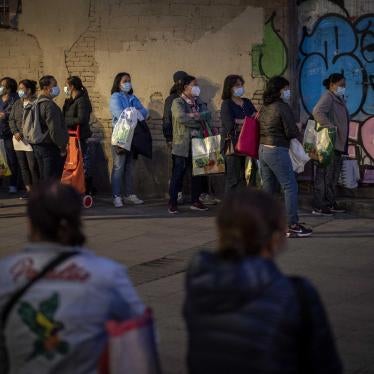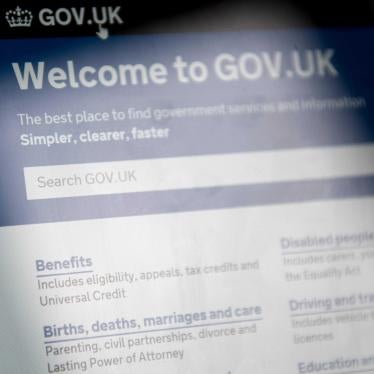April 12, 2013
The Honorable John F. Kerry
Secretary of State
U.S. Department of State
2201 C Street NW
Washington, DC 20520
Dear Secretary Kerry:
The Cotton Campaign is a global coalition of companies, human rights NGOs, industry associations, investors and trade unions dedicated to ending forced labor in the cotton sector of Uzbekistan. We write today to urge the State Department to place Uzbekistan in Tier 3 in the 2013 Global Trafficking in Persons Report unless the government of Uzbekistan invites a high-level, tripartite International Labour Organization observer mission to monitor this fall’s harvest prior to the report’s release.
In 2012, the Uzbek government not only failed to make “significant efforts to bring themselves into compliance” with the minimum standards of the Trafficking Victims Protection Act, but also continued to mobilize the forced labor of children and adults on a massive scale.
Reports from Uzbek civil society and human rights organizations, including the Uzbek-German Forum for Human Rightsand Human Rights Watch, confirm that thestate-sponsored forced labor of children and adults continued in the cotton sectorin2012. The provincial government offices (khokimiyats) coercively mobilized children ages 15 to 17 and adults to meet the 2012 harvest quotas. While there was not the nationwide shut-down of primary schools and mass mobilization of children under age 15 characteristic of previous harvests, these younger children were sporadically forced to pick cotton. Children forced to pick cotton worked excessive hours, conducting arduous physical work in hazardous conditions and under threat of punishment, including expulsion from school. Government employees – including teachers, doctors, nurses, and soldiers – and private business employees were forced to pick cotton under threat of dismissal from work, the loss of salary, pensions and welfare benefits. Authorities extracted fines from those who failed to meet their cotton quotas. The scale of forced labour of government employees disrupted the delivery of essential public services such as health care and education. As in years past, authorities continued to harass and arbitrarily detain independent Uzbek civil society activists who attempted to monitor forced labor in the cotton fields, even holding one activist, Uktam Pardaev, in incommunicado detention for 15 days in September 2012.
This pattern of facts has not fundamentally changed—and has remained the basis for a consistent characterization as forced labor and child labor on the part of the world’s most authoritative bodies. The 2012 US Department of Labor Findings on the Worst Forms of Child Labor report ranked Uzbekistan as having “made no advancement.” The 2013 ILO Committee of Experts report noted “serious concern” that the government of Uzbekistan has not accepted the high-level tripartite mission and the “evident contradiction” between the government’s position and “the views expressed by numerous UN bodies and social partners that this worst form of child labour remains a serious problem in the country.” The International Organization of Employers and International Trade Union Confederation also repeated their shared concern for the “systematic and persistent use of forced labour, including forced child labour, in the cotton fields of Uzbekistan.”
While many governments fail to effectively curb human trafficking, Uzbekistan stands out. The Uzbek government organizes, orchestrates, and benefits from forced labor on a massive scale. An upgrade of Uzbekistan to Tier 2, in spite of the evidence that shows that the Uzbek government has made no significant efforts to comply with the minimum legal standards, would seriously call into question the credibility of the JTIP Report.
In the coming weeks, the legal requirement to place Uzbekistan in Tier 2 or 3 in the 2013 JTIP Report combined with the confluence of the report’s June release and the International Labour Conference present unique leverage. An invitation from the government of Uzbekistan to the ILO to conduct tripartite monitoring during the 2013 cotton harvest would represent the minimum step expected by the multi-stakeholder international community of the government of Uzbekistan to demonstrate significant effort to address human trafficking. If Tashkent fails to invite the ILO prior to the release of the JTIP Report and the State Department ranks Uzbekistan Tier 3, State may maintain principled engagement by urging Tashkent to invite the ILO observer mission prior to August 1, 2013, to avoid sanctions available under Tier 3.
We understand that you have a number of important bilateral issues to consider with respect to Uzbekistan, but we firmly believe that the continuing reality of the situation of forced labor—including forced child labor—must be fully acknowledged by the report; that credibility of the JTIP process be maintained; and that the leverage the State Department has during the coming months be used to maximum possible advantage.
Sincerely,
The Cotton Coalition:
Advocates for Public Interest Law
American Apparel & Footwear Association
American Federation of Labor and
Congress of Industrial Organizations (AFL-CIO)
American Federation of Teachers
Anti-Slavery International
Awareness Projects.org
Boston Common Asset Management, LLC
Calvert Investments
Catholic Health East
Child Labor Coalition
Dominican Sisters of Hope
Eileen Fisher
Environmental Justice Foundation
Ethical Trading Initiative
European Center for Constitutional and Human Rights
Eurasian Transition Group
Fifth and Pacific Companies
Freedom House
Gonggam Human Rights Law Foundation
H & M
Human Rights Society of Uzbekistan “EZGULIK”
Human Rights Watch
Korea Sustainability Investing Forum
Korean Teachers and Education Workers Union (KTU, or Jeon Gyo Jo)
International Crisis Group
International Labor Rights Forum
Levi Strauss & Co.
Lululemon Athletica
Maidenform
Mast Global Fashions
Mercy Investment Services, Inc.
National Consumers League
National Retail Federation
Nike
Open Society Foundations
Pax World Mutual Funds
Province of St. Joseph of the Capuchin Order
Region VI Coalition for Responsible Investment
Responsible Sourcing Network
Retail Industry Leaders Association
Sisters of Charity of Cincinnati Corporate Responsibility Committee
Sisters of St. Francis of Philadelphia
Solidarity Center
Stop the Traffik Australia
Sunshine Coalition
Uniting Church in Australia, Synod of Victoria and Tasmania
Ursuline Sisters of Tildonk, U.S. Province
United States Association of Importers of Textiles and Apparel
Uzbek-German Forum for Human Rights
Walden Asset Management
cc: Seth D. Harris, Acting Secretary, Deputy Secretary of Labor
William J. Burns, Deputy Secretary of State
Robert O. Blake, Assistant Secretary of State for South and Central Asian Affairs
Uzra Zeya, Acting Assistant Secretary, Principal Deputy Assistant Secretary of State for Democracy,
Human Rights and Labor
George Krol, United States Ambassador to the Republic of Uzbekistan
Luis CdeBaca, Ambassador-at-Large, Office to Monitor and Combat Trafficking in Persons








